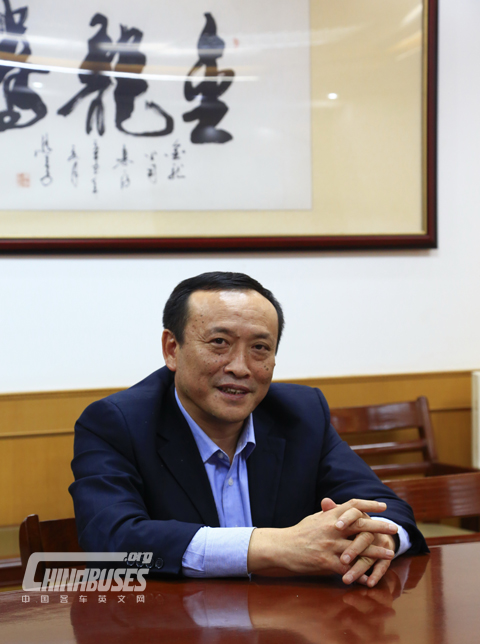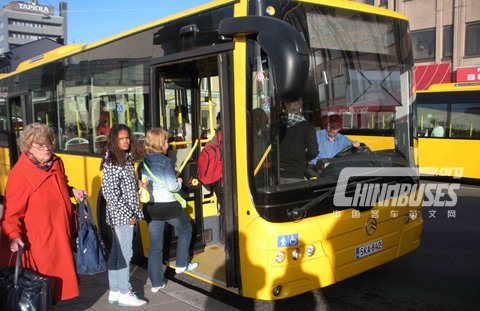10 years ago, the China"s bus industry marched in overseas market, creating quite a stir, until the financial crisis of 2008. Then since 2010, China"s bus industry started to recover from the economic crisis and begin once again to expand overseas. The ups and downs of Golden Dragon in Russia"s market can be regarded as a microcosm of the whole process of China"s bus industry penetrating into overseas market.
In January 2013, Golden Dragon set up its overseas subsidiary in Russia, the first overseas subsidiary in China"s bus industry. This created a new pattern for China"s bus industry in overseas market. It"s been one year since the Russian subsidiary was established. In a person"s life, one year old is a toddling and babbling period. But for an enterprise full of ambitions, one year old is a period filled with exploration and hope, struggles and success.
So what has the Russian subsidiary done in this one year? Recently, the reporter interviewed the general manager Bao Hongquan and the deputy general manager Ju Jiang of Golden Dragon"s Overseas Sales Company, sharing the history of Golden Dragon"s breaking through in overseas market.

Bao Hongquan, General Manager of Golden Dragon"s Overseas Sales Company
The "recovery growth" of the ace in export
Starting from 2003, Golden Dragon"s export business reached its peak in 2007, with an aggregate amount of $ 143 million, more than 1 billion yuan at the exchange rates of that time, topping the export in China"s bus industry. After 2008, the export began to decline sharply due to various reasons including the financial crisis, and in 2009, its aggregate amount was less than $ 15 million.
Falling into the bottom from the peak, Golden Dragon began to re-sort the overseas market, adjusting the layout and structure of the overseas market. After its re-sail , the overseas sales soared to $ 67 million in 2011, $ 98 million in 2012, and 2013 over $ 100 million in2013. "Now the sales growth in overseas market for us is actually "recovery growth"." Mr. Bao said.
Golden Dragon"s export targets used to be the Middle East, Russia and South Africa. Now Africa became its largest market, with central and southern America"s markets sprouting.
"The competition of light vehicles is very intense both at home and abroad. In the overseas market, the profit is very low when we have so many competitors including the second-hand vehicles from countries like Japan. Relatively large vehicles would be better, even though the competition from domestic enterprises is also very fierce. Faced with this situation, differentiated strategy was adopted in overseas market. We mainly export large vehicles with higher configurations to avoid the competition with low-end models from some domestic enterprises. This is also consistent with our brand image and will help us last longer in this market. The overseas customers" growing awareness of China"s bus brands and their operating pressure in the wake of the financial crisis lead to more careful examination before the actual purchase."
Golden Dragon, valuing its product quality, customer service, and brand image, experienced steady expansion in the overseas market.
To start from below 0
Russia is a representative overseas market of Golden Dragon"s.
Golden Dragon used to have a few achievements in Russia. Since its first contact in 2005, the sales of model XML6117 reached 800 sales. At that time in St.Petersburg, the new buses of Russia"s Third Bus Company were almost all from Golden Dragon. However, later in Russia"s market, Golden Dragon paid heavily for the reckless of its partner.

Golden Dragon XML6117
"In accordance with Russian regulations, imported buses must be certified by Russia, which means every bus has to get this "certification" in order to sell. And their regulations require that the application must be submitted by a local company and the certification will be owned by the local company. This is different from other European countries, where the certification could belong to the manufacturer. In such regulations, we had to cooperate with local distributors for the certification, sharing the costs." The deputy general manager of Golden Dragon"s Overseas Sales Company Ju Jiang told us.
Golden Dragon"s cooperation with its distributor was initially very smooth. The market was quickly opened, new buses arriving at Russia in a steady flow.
However, due to the distributor"s aggressive sales policy of using the capital to invest in other industries, the funding strand got broken, and in 2008, its company went into bankruptcy. This led to serious financial problems for Golden Dragon. Besides, the after-sales service in Russia also became a major problem, as the customers can not find the original distributor for bus repair and maintenance. The market dropped to the bottom as customers got so disappointed with Golden Dragon.
"When picking up the Russian market in 2009, we were not starting from 0 but the negative. We had a lot of customers, but most of them were in the impression that the after-sales service of this brand was not good. Besides, we no longer had the certification as the original distributor went bankrupt. The money spent on the certification was also gone." Ju Jiang said. Drawing from this lesson, Golden Dragon became very serious in the choice of new distributors and decided to bear all the costs of the new certification. However, to further develop the Russian market, such kind of cooperation was still going to be a huge risk for Golden Dragon. "With the distributor growing bigger, holding the certification, things could become tricky when we have different interest."
To change the situation: Russia"s "subsidiary model"
Under this situation, Golden Dragon set up its overseas subsidiary in Russia, which was the first overseas subsidiary of the China"s bus industry. "The concept of subsidiary is different from branch and agency. It is a local registered company in Russia with an independent legal person. Golden Dragon has 100% of its controlling stake, which enables us to apply for the certification, just like the distributor, only with a independent legal person, meaning we could control the risks. All the certifications can be placed under the name of the company, which lays solid foundation for the long-term development in this market."
The benefits of establishing a subsidiary were soon shown out.
In 2013, Russia introduced non-tariff barriers on imported buses not manufactured by the Russia, Belarus and Kazakhstan alliance, raising the price of imported buses by about 10%. With the rapid development of Russia’s local bus manufacturing companies, China"s buses lost its competitiveness in Russia. The bus export to Russia was almost cut off.
"With this policy coming out, the bus export of other Chinese companies to Russia was almost stagnant. But we had already certified many other models like tourist bus and long-distance bus, which enabled us to survive the impact. If there were no establishment of the subsidiary, the Russian market would no longer exist, but the reality is that our sales in Russia at least doubled this year. " Mr. Bao said.
China"s bus industry will no doubt expand into the overseas market in the future. Apparently, Gold Dragon has already took the first step.